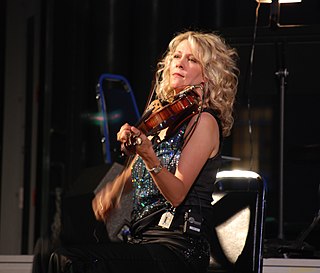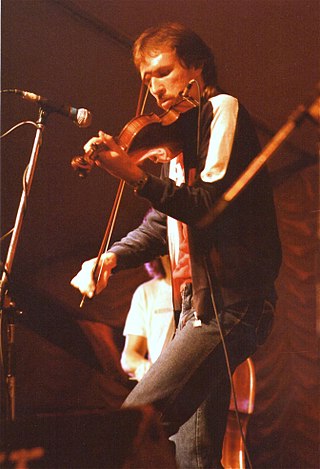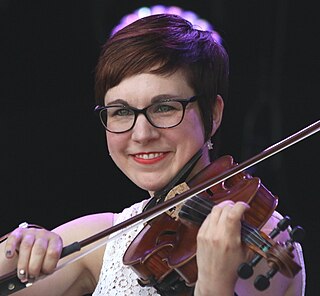Related Research Articles

A fiddle is a bowed string musical instrument, most often a violin. It is a colloquial term for the violin, used by players in all genres, including classical music. Although in many cases violins and fiddles are essentially synonymous, the style of the music played may determine specific construction differences between fiddles and classical violins. For example, fiddles may optionally be set up with a bridge with a flatter arch to reduce the range of bow-arm motion needed for techniques such as the double shuffle, a form of bariolage involving rapid alternation between pairs of adjacent strings. To produce a "brighter" tone than the deep tones of gut or synthetic core strings, fiddlers often use steel strings. The fiddle is part of many traditional (folk) styles, which are typically aural traditions—taught "by ear" rather than via written music.

Ashley Dwayne MacIsaac is a Canadian fiddler, pianist, singer and songwriter from Cape Breton Island. He has received three Juno Awards, winning for Best New Solo Artist and Best Roots & Traditional Album – Solo at the Juno Awards of 1996, and for Best Instrumental Artist at the Juno Awards of 1997. His 1995 album Hi™ How Are You Today? was a double-platinum selling Canadian record. MacIsaac published an autobiography, Fiddling with Disaster in 2003.
Daniel Edward Lapp is a Canadian folk musician based in Victoria, British Columbia and Pender Island.

Natalie MacMaster is a Canadian fiddler from Troy, Inverness County, Nova Scotia, who plays Cape Breton fiddle music. She has toured with the Chieftains, Faith Hill, Carlos Santana and Alison Krauss, and has recorded with Yo-Yo Ma. She has appeared at the Celtic Colours festival in Cape Breton, Celtic Connections in Scotland and MerleFest in the United States.

Mark O'Connor is an American fiddle player, composer, guitarist, and mandolinist whose music combines bluegrass, country, jazz and classical. A three-time Grammy Award winner, he has won six Country Music Association Musician Of The Year awards and was a member of three influential musical ensembles: the David Grisman Quintet, The Dregs, and Strength in Numbers.

April Verch is a Canadian fiddler, singer, and step dancer raised in the community of Rankin, Ontario, located approximately 15 kilometres (9.3 mi) southwest from Pembroke, Ontario. The youngest daughter of Ralph and Muriel Verch, April began step dancing at age three with her first step dance teachers, Buster and Pauline Brown, and began learning fiddle at age six from Pembroke fiddler Rob Dagenais, shortly after receiving her first violin as a birthday present. Throughout her childhood, April played both old time fiddle and classical violin, having competed and having won awards at fiddle contests inside and outside Ontario, as well as regularly performing with the Deep River Symphony Orchestra over that period. She also competed and won numerous awards for her step dancing in that time frame as well.

The Quebe Sisters are an American swing revival band based in Dallas, Texas, who perform a mix of progressive western swing, jazz-influenced swing, country, Texas-style fiddling, and western music. The band consists of sisters Grace, Sophia, and Hulda Quebe, all of whom play the fiddle and sing, with supporting musicians accompanying on guitar, upright bass, or other instruments.
Calvin Vollrath is a Canadian fiddler and composer and is one of the few European-Canadian fiddle players playing professionally in the Métis style. He lives in St. Paul, Alberta.
Jean Baptiste "John" Arcand, is a Canadian fiddler, composer, teacher, and luthier. Arcand has been composing and performing since childhood, having learned the traditional Métis tunes from his father Victor and his grandfather Jean-Baptiste. John Arcand has said, "I knew from childhood I would be a fiddler." "I love the constant challenge because you cannot ever master the fiddle." He is known for the impeccable sense of timing in his music, a skill that is necessary when guiding dancers.

Canadian fiddle is the aggregate body of tunes, styles and musicians engaging the traditional folk music of Canada on the fiddle. It is an integral extension of the Anglo-Celtic and Québécois French folk music tradition but has distinct features found only in the Western hemisphere.
Quebec fiddle is a part of the Old time fiddle canon and is influential in New England and Northwest fiddle styles.
Graham Craig Townsend was a Canadian fiddler, mandolin player, pianist and composer active from the 1950s through the 1990s.
Shane Ken Cook is a Canadian violinist. He is a long-time member of the celtic fusion ensemble Bowfire, and is a past Canadian Grand Master fiddler and U.S. National Fiddle Champion. His musical career has taken him to tour across Canada, the United States, Mexico, Germany, England, China and Taiwan.
Patti Kusturok (Lamoureux) ( KUS-tə-rok) is a Canadian fiddler, performer, teacher, and composer who is known as "Canada's old-time fiddling sweetheart." She resides in Winnipeg, Manitoba where she teaches fiddling. She performs frequently in addition to teaching at workshops and music camps each summer. She has taught at the Emma Lake Fiddle Camp, Shivering Strings Fiddle Camp in Winnipeg, and Falcon Lake Fiddle Camp. Her son, Alex Kusturok is also a champion fiddler.
Billy Contreras is an American jazz violinist and bluegrass fiddler, multi-instrumentalist, session player and educator.
Gordon Stobbe C.M is a Canadian fiddler, multi-instrumentalist, and composer based in Seaforth, Nova Scotia. Stobbe was born in Saskatchewan, but has made his home on the East Coast of Canada since 1977. His musical interests and passion lie in the field of Canadian traditional music, especially as it is expressed in a wide variety of fiddle styles. He plays several instruments, including fiddle, mandolin, guitar, clawhammer banjo, piano, accordion and percussion.
The Maritime Fiddle Festival is the longest running old-time fiddle contest in Canada. It is also the largest fiddle contest in the region.
The Canadian Grand Masters is an annual event celebrating traditional fiddling in Canada. Considered "the pinnacle of Canadian fiddling," the core of the event is a concert/dance on Friday evening, followed by the competition the following day. Upwards of thirty contestants are selected to compete from across Canada, considered to be the top exceptional fiddlers from each province/territory. The winner of the contest earns the title of Canadian Grand Masters Fiddling Champion.
The Canadian Open Old-Time Fiddling Championship is one of the most important fiddle festivals in Canada. Founded in 1951, the contest was held annually in early August in Shelburne, Ontario. In the 2010s, it also became part of the Heritage Music Festival. It was the second longest-running fiddle competition in the country, although the contest has not been held since 2019. Several of the top fiddlers in Ontario have won the contest, including Pierre Schryer, Louis Schryer, Graham Townsend, Eleanor Townsend, Frank Leahy, Julie Fitzgerald, Shane Cook, and Scott Woods.
The Grand North American Old Time Fiddle Championship is the longest-running annual fiddle contest in Alberta, held in mid-July. The event started in 1981, becoming part of Klondike Days in the 1990s, and with virtual contests held during the COVID-19 pandemic in 2020 and 2021. Prior to the official event, similar contests held as fundraisers occurred in the late 1970s and early 1980s to help local communities. Several of its winners have gone onto place in the top three of the Canadian Grand Masters, including several winners, and in recent years prize money has been allocated to the best three Albertan fiddlers to help pay for travel to the Grand Masters.
References
- ↑ Ougler, Jeffrey (April 24, 2015). "Champion Canadian fiddler Scott Woods admits adding new themes to shows featuring age-old melodies can be challenge". Sault Star. Archived from the original on July 28, 2015. Retrieved May 23, 2024.
- ↑ "Scott Woods". Canadian Grand Masters Fiddling Association website. Accessed June 2018.
- ↑ "Scott Woods and Band 'Fiddle Up a Storm' Wednesday". Discover Humboldt, 17 May 2018. by Katie Kraus
- 1 2 Barnard, Elissa (September 22, 2011). "Fiddler channels more than Messer". Chronicle Herald. Archived from the original on June 20, 2018. Retrieved May 23, 2024.
- ↑ "Mackenzie-Smith talent terrific at annual show". Acton Free Press, Feb 29, 1964, page 5
- ↑ "Old-time fiddling competition a success". Brandon Sun, August 11, 1981
- ↑ "Maritime Fiddle Festival, Champion Class Past Winners" . Retrieved 16 November 2023.
- ↑ "Past Winners" Shelburne Fiddle Contest website.
- ↑ "Canadian Grand Masters Top Three Finalists 1990-Present" cgmfa-acgmv.ca
- ↑ "Fiddle-duddle". The Globe and Mail, Paul Waldie, Dec 18, 2004
- ↑ "Scott Woods Fiddling Champion Performs June 24, 2008 Southampton United Church". Saugeen Times,
- ↑ "Scott Woods-CD-Reflecting The Past-In Review". Atlantic Seabreeze, By John Gavin, Friday, April 07, 2006
- ↑ "Scott Woods-CD-Dancing Fiddles-In Review". Atlantic Seabreze, By John Gavin, Tuesday, December 19, 2006
- ↑ Ougler, Jeffrey (June 15, 2017). "Scott Woods may still play lead, but sister Kendra Woods-Norris is happy in her natural habitat providing harmonies; play Sault Monday". Sault Star. Archived from the original on June 15, 2017. Retrieved May 23, 2024.
- ↑ Jackson, Whitney (April 21, 2017). "Continuing a tradition, creating a legacy". International Falls Journal. Archived from the original on June 30, 2021. Retrieved May 23, 2024.
- ↑ "Scott Woods returns to Melfort to Fiddle Up A Storm. Melford Journal, May 22, 2018
- ↑ "Scott Woods' Old Time Christmas". Mitchell Advocate, December 11, 2017
- ↑ "Woods and his band fiddle around in Humboldt". Becky Zimmer, Humboldt Journal, May 18, 2016
- ↑ "Scott Woods' Old Time Jubilee in Tillsonburg Sunday". By Chris Abbott, Tillsonburg News, April 6, 2014
- ↑ Kirchmeir, Wolf (December 15, 2010). "Fiddler Scott Woods plays to sell-out crowd". Elliot Lake Standard. Archived from the original on June 20, 2018. Retrieved May 23, 2024.
- 1 2 "Masterful fiddling". Fort Francis Times, Dec 6, 2017. Duane Hicks
- ↑ "Scott Woods returns with Twin Fiddle Express". Melfort Journal. May 22, 2017. Archived from the original on May 23, 2017. Retrieved May 23, 2024.
- ↑ The Island Fiddler, September 2017, page 10
- ↑ "In the key of . . eh?". Dauphin Herald, May 19, 2015
- ↑ Neuhaus, Danielle (September 4, 2017). "German-Canadian impressions: Interview with musician Scott Woods". DKG. Archived from the original on June 20, 2018. Retrieved May 23, 2024.
- ↑ "Two hours of musical thrills". Castlegar News, Jim Sinclair, Jun. 17, 2014
- ↑ "National fiddle champion raises funds across Saskatchewan". Northeast Now, By Clark Stork. November 19, 2017
- ↑ "Christmas Traditions with Scott Woods". Snapd Ajax, December 2017
- ↑ "A Nice Surprise for Residents at Wellington Terrace". Grand 101FM Radio. March 31, 2017. Archived from the original on June 22, 2018. Retrieved May 23, 2024.
- ↑ "The Shelburne Heritage Music Festival & The 67th Canadian Open Old Time Fiddle Championship of 2017!". The Shelburne Freelancer
- ↑ "Canadian Grand Masters Lifetime Achievement Award Winners" cgmfa-acgmv.ca
- ↑ "Canadian Grand Masters 29th Annual Contest Program" (PDF). cgmfa-acgmv.ca. September 25, 2018. p. 36-37. Archived from the original (PDF) on July 9, 2021. Retrieved May 23, 2024.